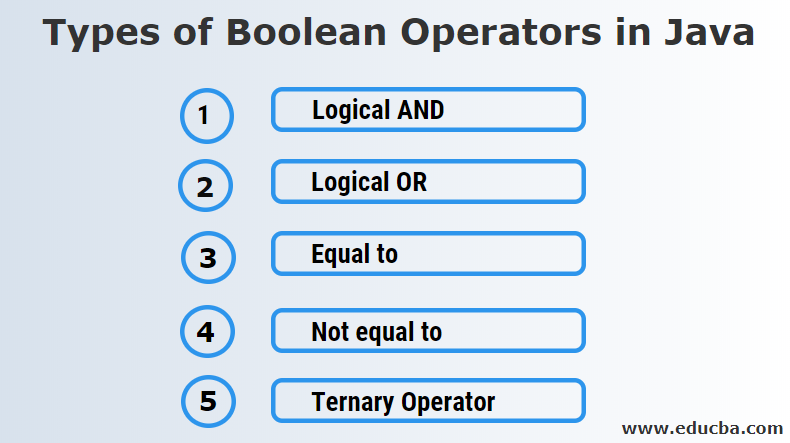Updated March 14, 2023

Introduction to Boolean Operators in java
With the advent of technology, computers have developed, which in turn brought the requirement for programming language. Many programming languages include both low-level language as well as high-level language. High-level languages are easier to use as they are easy to understand in comparison to low-level languages. Java is one such high-level language which is used widely as a backed language for programming purpose. There are lots of a concept that one needs to study and practice to understand basic concepts. In this topic, we will be discussing Boolean operators in Java.
What is Boolean Operator?
Boolean operators are simply a set of different operators that could be used to compare expressions. Boolean operators generally have two values, either false or true. Boolean operators compare the expression of the left-hand side and the right-hand side. In comparison, it simply returns a Boolean value.
Types of Boolean Operators in Java
There are various types of Boolean operators in Java. Following are the various types of Boolean operators in Java that are most widely used.
1. Logical AND Operator
This is a logical assignment that use the && operator to compare logical expression. It generally gives false if any of the multiple logic fails or gives true if all the expression produces true.
Example of AND operator
- If both operands are true, then the operation result is true
Code:
public class Main
{
public static void main(String[] args) {
boolean a = true;
boolean b = true;
System.out.println (a && b); // shows the logical operation using operator
}
}Now, execute the above code
Output:
- If both operands are false, then the operation result is false.
Code:
public class Main
{
public static void main(String[] args) {
boolean a = false;
boolean b = false;
System.out.println (a && b); // shows the logical operation using operator
}
}Now, execute the above code
Output:
- If one operand is true and the other is false, then the operation result is false.
Code:
public class Main
{
public static void main(String[] args) {
boolean a = true;
boolean b = false;
System.out.println (a && b); // shows the logical operation using operator
}
}Now, execute the above code
Output:
- If one operand is false and the other is true, then the operation result is false.
Code:
public class Main
{
public static void main(String[] args) {
boolean a = false;
boolean b = true;
System.out.println (a && b); // shows the logical operation using operator
}
}Now, execute the above code
Output:
2. Logical OR Operator
This is a logical assignment which uses || operator to compare logical expression. It generally gives true if any of the expression becomes true and returns false if all the expression fails.
Example of OR operator
- If both operands are true, then the operation result is true.
Code:
public class Main
{
public static void main(String[] args) {
boolean a = true;
boolean b = true;
System.out.println (a || b); // shows the logical operation using operator
}
}Now, execute the above code
Output:
- If both operands are false, then the operation result is false.
Code:
public class Main
{
public static void main(String[] args) {
boolean a = false;
boolean b = false;
System.out.println (a || b); // shows the logical operation using operator
}
}Now, execute the above code
Output:
- If one operand is true and the other is false, then the operation result is true.
Code:
public class Main
{
public static void main(String[] args) {
boolean a = true;
boolean b = false;
System.out.println (a || b); // shows the logical operation using operator
}
}Now, execute the above code
Output:
- If one operand is false and the other is true, then the operation result is true.
Code:
public class Main
{
public static void main(String[] args) {
boolean a = false;
boolean b = true;
System.out.println (a || b); // shows the logical operation using operator
}
}Now, execute the above code
Output:
3. Equal to Operator
This operator is used to check if operand or expression on both sides of the operator are equal or not.
Example of Equal to operator
- If both operands are not the same, the operation result is false.
Code:
public class Main
{
public static void main(String[] args) {
String a = "abc";
String b = "abcd";
System.out.println (a == b); // shows the logical operation using operator
}
}Now, execute the above code
Output:
- If both operands are the same, the operation result is true.
Code:
public class Main
{
public static void main(String[] args) {
String a = "abc";
String b = "abc";
System.out.println (a == b); // shows the logical operation using operator
}
}Now, execute the above code
Output:
4. Not Equal to Operator
This operator is used to check if operand or expression on both sides of the operator are equal or not. It produces true if operands on both sides are not the same; else gives false.
Examples of not equal to operator
- If both operands are not the same, the operation result is true.
Code:
public class Main
{
public static void main(String[] args) {
String a = "abc";
String b = "abcd";
System.out.println (a != b); // shows the logical operation using operator
}
}Now, execute the above code
Output:
- If both operands are the same, the operation result is false.
Code:
public class Main
{
public static void main(String[] args) {
String a = "abc";
String b = "abc";
System.out.println (a != b); // shows the logical operation using operator
}
}Now, execute the above code
Output:
5. Ternary Operator
This operator is used to check if else conditions. It is generally shorthand for the if-else statement. If the expression is true, then if the part is executed otherwise, else block is executed. It uses two operands which are ?:
Example of Ternary Operator
public class Main
{
public static void main (String[]args){
int a = 2;
int b = 5;
int minOfNum = (a < b) ? a : b;
System.out.println (minOfNum);
}
}Output:
In expression, (a < b) ? a : b it evaluates the value. Based on the evaluation, it executes if or else block
Conclusion
Java is a programming language where there are lots of concepts that one needs to study. Boolean operators are one of those. These boolean operators basically execute the code to check whether the expression value is true or not. Based on the expression evaluation, it returns the value. A boolean operator is widely used in any programming language to various logical programming expressions.
Recommended Articles
This has been a guide to Boolean operators in Java. Here we discuss the basic concept and different types of Boolean operators in Java-like Logical AND, Logical OR, Equal to, Not equal to, Ternary Operator with respective examples. You can also go through our other suggested articles to learn more –


